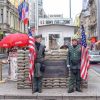Overcoming the division
The new order in Europe was sealed when Germany reunified. Discover the most important background facts here.

It was ten years before that famous 3 October 1990, the “Day of German Unity” that has been a national holiday ever since, that the way was paved for the end of Europe’s division and for German reunification. On 14 August 1980, almost all 17,000 workers at the Lenin Shipyard in the Polish city of Gdansk went out on strike. It was then that people behind the “Iron Curtain” – as it was known in the West – learnt that their voices could not be suppressed for ever. Five years later, on 11 March 1985, a new general secretary of the Communist Party was elected in Moscow: Mikhail Gorbachev. This was the second key step on the path to German unity and European freedom. After 14 August 1980 the road was still long and painful, with many people losing their freedom and many others their lives, before in 1990 the Two Plus Four Agreement and finally the Accession Treaty established the legal basis for a new, peaceful order in all of Germany and in Europe.

Germany, which had been divided since 1949, four years after the end of the Second World War, was peacefully reunited thanks to the courage shown by many citizens of the GDR in their fight for freedom and democracy:
Before reunification could take place, a legal framework had to be put in place to allay the fears and concerns associated with the emergence in the heart of Europe of an economically-strong united Germany with a large population. The instrument used to do this was the Two Plus Four Agreement in which the Federal Republic of Germany, the GDR and the victorious powers of the Second World War – the USA, the Soviet Union, the United Kingdom and France – negotiated the borders and status of Germany: Achieving Unity
It was after reunification that the real work began within Germany: living conditions in the two parts of Germany had to be harmonised, and much the same had to happen in business and science, nursery schools, and the education and pension systems: 25 German years
30 years after the historic event much has grown together, though not everything. Read an assessment here: Germany without the Wall
and here: One country – many differences
And how do young Germans experience their nation – those who only know about the divided Germany from the stories told by their parents? Deutschland.de talked to people who were born in the year that the Berlin Wall came down:
- Here is what Greta from Recklinghausen has to say: A life without the Wall
- Stefan from Berlin: Growing together
- Angie from Neubrandenburg: No Young Pioneer’s badge
If you want to find out more about German unity:


